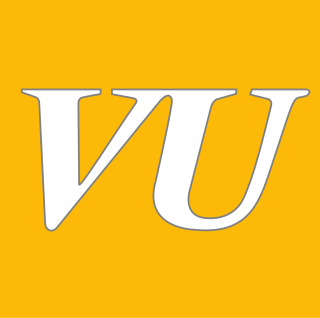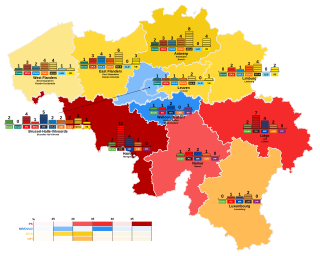
The European Free Alliance (EFA) is a European political party that consists of various regionalist, separatist and minority political parties in Europe. Member parties advocate either for full political independence and sovereignty, or some form of devolution or self-governance for their country or region. The party has generally limited its membership to centre-left and left-wing parties; therefore, only a fraction of European regionalist parties are members of the EFA.

Flanders is the Dutch-speaking northern portion of Belgium and one of the communities, regions and language areas of Belgium. However, there are several overlapping definitions, including ones related to culture, language, politics, and history, and sometimes involving neighbouring countries. The demonym associated with Flanders is Fleming, while the corresponding adjective is Flemish, which can also refer to the collective of Dutch dialects spoken in that area, or more generally the Belgian variant of Standard Dutch.

Vlaams Blok was the name of a Belgian far-right and secessionist political party with an anti-immigration platform. Its ideologies embraced Flemish nationalism, calling for the independence of Flanders.

Christian Democratic and Flemish is a Flemish Christian-democratic political party in Belgium. The party has historical ties to both trade unionism (ACV) and trade associations (UNIZO) and the Farmer's League. Until 2001, the party was named the Christian People's Party.

The New Flemish Alliance is a Flemish nationalist, conservative and Eurosceptic political party in Belgium. The party was established in 2001 by the right-leaning faction of the centrist-nationalist People's Union (VU).

People's Union was a Flemish nationalist political party in Belgium, formed in 1954 as a successor to the Christian Flemish People's Union.

Sociaal-Liberale Partij was a Belgian Flemish political party formed after dissolution of the moderate nationalist People's Union (Volksunie) party. Prior to 19 April 2008 it was known as Spirit, and intermediately as Flemish Progressives (VlaamsProgressieven). The party merged with Groen in the end of 2009, ceasing to exist.

The Flemish Movement is an umbrella term which encompasses various political groups in the Belgian region of Flanders and, less commonly, in French Flanders. Ideologically, it encompasses groups which have sought to promote Flemish culture and the Dutch language as well as those seeking greater political autonomy for Flanders within Belgium. It also encompasses nationalists who seek the secession of Flanders from Belgium, either through outright independence or (re)unification with the Netherlands.

Greater Netherlands is an irredentist concept which unites the Netherlands, Flanders, and sometimes Brussels. Additionally, a Greater Netherlands state may include the annexation of the French Westhoek, Suriname, formerly Dutch-speaking areas of Germany and France, or even the ethnically Dutch and/or Afrikaans-speaking parts of South Africa. A related proposal is the Pan-Netherlands concept, which includes Wallonia and potentially also Luxembourg.
On 13 June 2004, regional elections were held in Belgium, to choose representatives in the regional councils of the Flemish Parliament, the Walloon Parliament, the Brussels Parliament and the German-speaking Community of Belgium. The elections were held on the same day as the European elections.

The Vlaamsch Nationaal Verbond, widely known by its acronym VNV, was a Flemish nationalist political party active in Belgium between 1933 and 1945. It became the leading force of political collaboration in Flanders during the German occupation of Belgium in World War II. Authoritarian by inclination, the party advocated the creation of a "Greater Netherlands" (Dietsland) combining Flanders and the Netherlands.

Flanders is both a cultural community and an economic region within the Belgian state, and has significant autonomy.
Vlaams Belang is a Flemish nationalist, Eurosceptic and right-wing populist political party in the Flemish Region and Brussels Capital Region of Belgium. It is widely considered by the media and political analysts to be on the political far-right, although it self-describes as right-nationalist and has tried to distance itself from the far-right label in recent years.

Flemish political parties operate in the whole Flemish Community, which covers the unilingual Flemish Region and the bilingual Brussels-Capital Region. In the latter, they compete with French-speaking parties that all also operate in Wallonia. There are very few parties that operate on a national level in Belgium. Flanders generally tends to vote for right-wing, conservative parties, whereas in French-speaking Belgium the socialist party is usually the most successful one.

Matthias Edward Storme is a Belgian lawyer, academic and conservative philosopher.

Federal elections were held in Belgium on 10 June 2007. Voters went to the polls in order to elect new members for the Chamber of Representatives and Senate.

Libertarian, Direct, Democratic is a conservative-liberal, libertarian, right-wing populist Flemish political party in Belgium.
The 2007–2011 Belgian political crisis was a period of tense communal relations and political instability in Belgium, which was rooted in the differing opinions on state reform, and in the continued existence of the controversial electoral district of Brussels-Halle-Vilvoorde (BHV). Parties from the Dutch-speaking Flemish Community are in general strongly in favour for a devolution of powers to the communities and regions, and the splitting of the unconstitutional BHV district, while French-speaking French Community of Belgium is generally in favour of retaining the status quo. After the 2010 elections, the topics of public debt, deficit cuts and socio-economic reform were added to the debate, with most Flemish parties in favour of finding money by strongly reducing spending, whilst the proposals supported by most French-speaking parties also included a significant raise in taxes. The crisis came to an end in December 2011 with the inauguration of a new federal government which agreed on partition of the BHV district and on policies aimed at tackling the economic downturn. The country's continuing linguistic divide played a large part in the crisis. Several times during the period Belgium was threatened to be split up amid rising Flemish separatism.

Federal elections were held in Belgium on 13 June 2010, during the midst of the 2007-11 Belgian political crisis. After the fall of the previous Leterme II Government over the withdrawal of Open Flemish Liberals and Democrats from the government the King dissolved the legislature and called new elections. The New Flemish Alliance, led by Bart De Wever, emerged as the plurality party with 27 seats, just one more than the francophone Socialist Party, led by Elio Di Rupo, which was the largest party in the Wallonia region and Brussels. It took a world record 541 days until a government was formed, resulting in a government led by Di Rupo.














